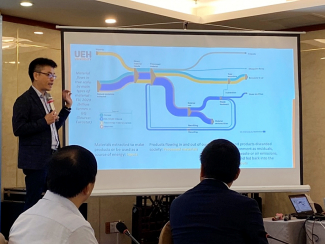Public opinion on carbon pricing and revenue uses in East Africa
Foreword by EBA
The ongoing climate crisis calls for radically reduced emissions of greenhouse gases. Although low- and lower-middle-income countries may have small or minimal climate footprints compared to richer countries, reductions are key also in those countries, not least since future consumption is likely to increase with increasing economic growth and population.
Socioeconomic and air quality indicators help improve air quality in Bogotá
Bogotá, the capital of Colombia, suffers from heavy air pollution, EfD researchers have studied alternative solutions to evaluate what interventions are most effective. The result of their work is now
EfD Researchers contribute to Vietnam’s circular economy plan
EfD Vietnam has made several contributions to the country's National Action Plan for Circular Economy which was presented to the Prime Minister in December 2023 and is to be implemented in 2024
Economic values for ecosystem services: A global synthesis and way forward
This paper presents a global synthesis of economic values for ecosystem services provided by 15 terrestrial and marine biomes. Information from over 1,300 studies, yielding over 9,400 value estimates in monetary units, has been collected and organised in the Ecosystem Services Valuation Database (ESVD). This is a substantial expansion of data since the de Groot et al. (2012) description of the ESVD and provides an important juncture to explore developments in the use of valuation methods and the contexts in which valuations are conducted.
Disentangling the chicken or egg problem of household waste sorting and segregated waste collection
Merely providing a collection service that ensures waste segregated at source is not mixed during transportation is not enough to induce households to segregate. Information campaigns are a must.
This research brief is based on the EfD Discussion Paper titled Disentangling the chicken or egg problem of household waste sorting and segregated waste collection: A randomized control trial in India by authors Shivani Wadehra, Zihan Nie, and Francisco Alpizar
About the study
Poverty and gender considerations in marine spatial planning: Conceptual Framework
The report provides a framework for ensuring that marine spatial planning (MSP) does not worsen poverty and gender inequality in developing countries, and that potentially marginalised groups are appropriately considered and engaged in the MSP process.
This report provides guidelines for the steps of a more inclusive MSP process.
The findings indicate that a scorecard can be used to guide the social sustainability of the MSP process. The criteria in the scorecard include:
Local Effects of Payments for Ecosystem Services on Rural Poverty
Using household surveys and spatial geographic data, we are able to control for socioeconomic and geographic characteristics at the individual and census-tract levels. Our results suggest that while payments did not affect poverty rates at the national level, poverty did increase in places where PES had the greatest effect on deforestation. This effect is stronger for uneducated males, who tend to work in agricultural activities.
Pagination
- Previous page
- Page 4
- Next page



